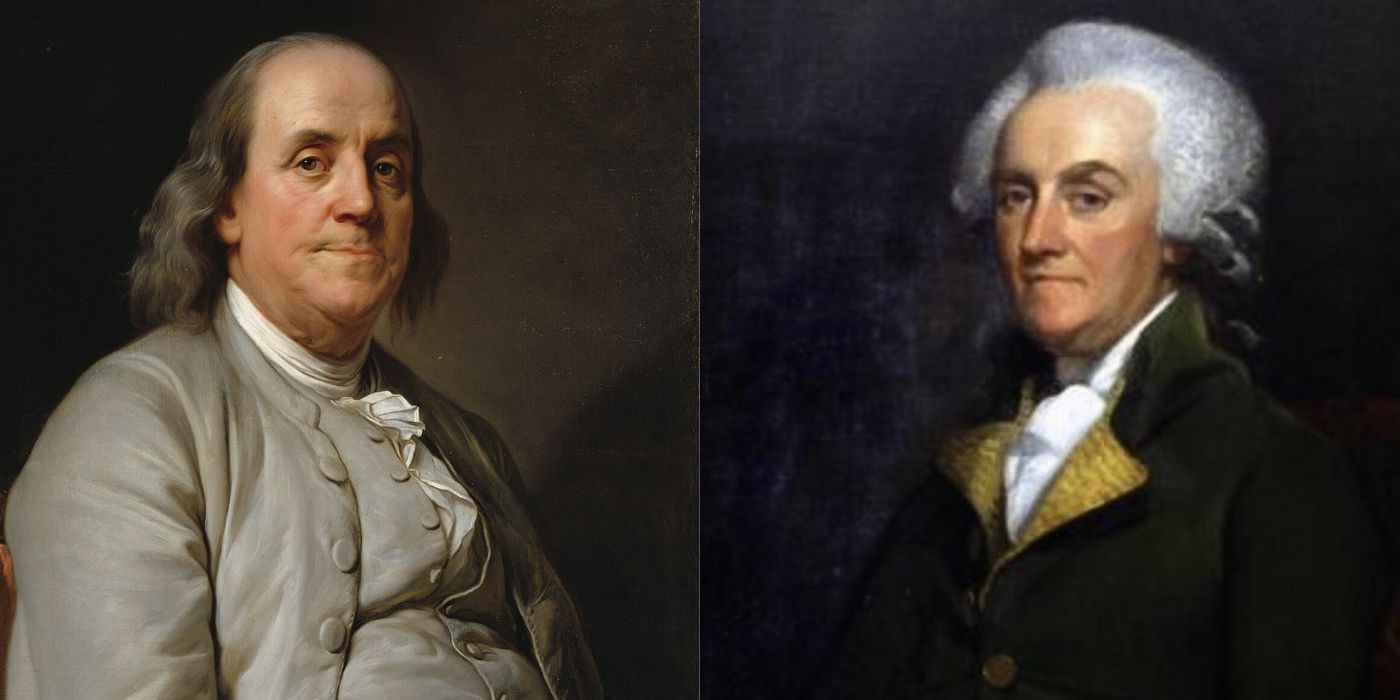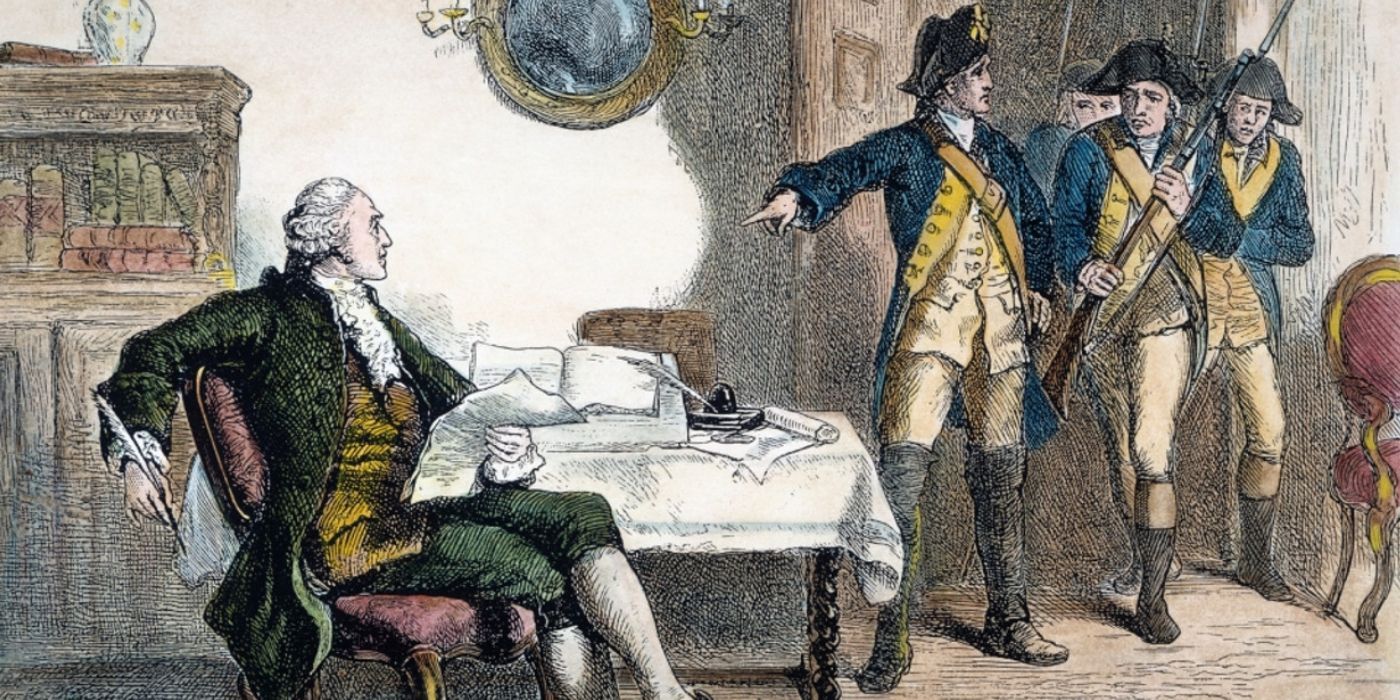Summary
- William Franklin, son of Benjamin Franklin, remained a staunch Loyalist during the Revolutionary War, causing a rift with his father.
- Despite attempts at reconciliation, Benjamin Franklin and William Franklin never fully reconciled, with bitterness lingering between them.
- Temple Franklin, grandson of Benjamin Franklin, did reconnect with William Franklin in London after the war, showing a family bond.
Benjamin Franklin's son William Franklin is referred to in passing a number of times in Franklin, and his backstory explains why he wasn't a major player in his father's secret mission to France during the Revolutionary War. Franklin chronicles Benjamin Franklin's negotiations with various members of the French government to secure aid for the United States of America during the Revolutionary War. At a time when even George Washington believed the game was up, Franklin's mission to convince the French to enter the war was of the utmost importance.
On his journey, Benjamin Franklin brought his grandson Temple along to act as his secretary, and the two had a close relationship during the time they spent overseas. However, his father William Franklin is conspicuously not a member of the cast of Franklin, and is spoken about only briefly in a clearly negative context, with reference to his imprisonment in America. The true story of William Franklin's time during the Revolutionary War explains why his name is only ever mentioned as an insult or casual reference.

Franklin Review: Michael Douglas Is Pivotal To Apple TV+'s Brilliant, Powerful Historical Drama
Franklin navigates the story of America's journey into independence with a talented cast and a contemporary feel despite the period setting.
Benjamin Franklin's Son, William Franklin, Was A Loyalist During The American Revolution
William Franklin sided with the monarchy, unlike his father.
Per the Encyclopedia Brittanica William Franklin was born in Philadelphia in 1730 as the illegitimate child of Benjamin Franklin (his mother's identity is unknown). Despite his birth status, William Franklin rose to prominence in Colonial America as a lawyer, and was even the final governor of New Jersey when it was still a colony of Great Britain at the behest of the British Prime Minister Lord Bute. Unlike his father, William Franklin's support for Britain never wavered, and he was one of the most prominent Loyalists in the colonies at the time the Revolutionary War broke out.
William Franklin delivered the famous "Two Roads" speech to the New Jersey assembly, which summarized that siding with the British would lead to prosperity and happiness, and siding with the Colonial rebels would lead to anarchy and war.
Despite Benjamin Franklin attempting to bring his son to the side of the United States of America, William Franklin remained loyal to Great Britain, which pushed Benjamin Franklin to effectively end their relationship. Even though he continued to lobby for New Jersey to side with the British, he remained governor until 1776. As a staunch Loyalist, William Franklin reported on the colonies to London, and was confined to house arrest in early 1776. After the Declaration of Independence, William Franklin was formally taken into custody by the New Jersey Congress, and spent two years in prison as referenced in Franklin.
After being released as part of a prisoner exchange in 1778, William Franklin moved to New York and became one of the primary Loyalist leaders there. He went so far as to set up Loyalist fighting units to plague the Colonial troops in New York, New Jersey, and Connecticut. Following the British defeat at Yorktown, which effectively ended the war, William Franklin left for England, never to return to the United States of America.
What Happened To William Franklin After The Revolutionary War
William Franklin left the United States for good after the war.
Once he arrived in Britain, William Franklin became one of the leading Loyalist voices in the country. His father was one of the main advocates for the United States to not provide amnesty for Loyalists who had left the country, owed in large part to his son's status as one. In 1784, William Franklin did make an effort to reconcile with his father via a letter, but Benjamin Franklin refused to accept it.
|
Franklin Episode Release Schedule |
||
|---|---|---|
|
Episode |
Title |
Release Date |
|
Episode 1 |
"Sauce For Prayers" |
April 12th |
|
Episode 2 |
"Welcome, Mischief" |
April 12th |
|
Episode 3 |
"Pride and Gout" |
April 12th |
|
Episode 4 |
"Small Revenge" |
April 19th |
|
Episode 5 |
TBA |
April 26th |
|
Episode 6 |
TBA |
May 3rd |
|
Episode 7 |
TBA |
May 10th |
|
Episode 8 |
TBA |
May 11th |
William Franklin did see his father Benjamin one final time in 1785 as he stopped in Britain on his way home from France, although there was no real attempt at a reconciliation of any kind. Benjamin Franklin remained businesslike, suggesting that his son give land that he owned in America to his son, William Temple Franklin. Benjamin Franklin omitted his son almost entirely from his will, and remained bitter towards his son for his Loyalist beliefs. William Franklin died in 1813 in London, having never reconciled with his father.
Temple's Relationship With William Franklin After The War Explained
William Franklin reconnected with his son overseas.
During the negotiations for the Peace of Paris at the conclusion of the Revolutionary War, Temple lobbied for his father to receive a diplomatic job as a reward for his support of the British government. In 1784 Temple moved to London and reconciled with his father. He lived with him for some time before returning to France, and William Franklin even took responsibility for Temple Franklin's illegitimate daughter, Ellen. Temple Franklin remained on good terms with his father, but his Loyalist beliefs are why William Franklin is omitted from his son's activities in Franklin, given the time period it covers.
Source: Encyclopedia Brittanica






